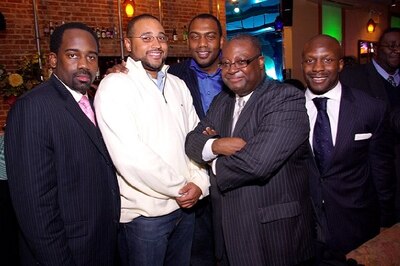Thoughts are falling many places this Election Day, and one place, especially among those who work at the Department of Education, is the life of Terence Tolbert, the DOE’s chief lobbyist who died Sunday night at age 44 while on a leave of absence to run Barack Obama’s campaign in Nevada.
Tolbert, by all accounts a tireless worker, was responsible for spearheading many of the DOE’s biggest projects, including the effort to raise the cap that kept the number of charter schools allowed in New York at 100 and the settlement of the historic Campaign for Fiscal Equity lawsuit. He also was a reliable public face for the Bloomberg administration around the city, chairing hearings often attended by unhappy parents, and one of just a small number of African-Americans among the DOE’s top leadership.
So strong was his commitment to his work for the Bloomberg administration that a friend, Larry Blackmon, told me that in his final days campaigning for Obama, Tolbert was already starting to look forward to his next fight, on behalf of renewing the law that gives control of the public schools to the mayor. “He made it a point to me to tell me that the day after it was over he was packing up and he was driving back,” Blackmon said. “He was really looking forward to coming back home.”
But on Tolbert’s Facebook page, in our comments section, and in conversations I had with his friends this week, the overwhelming impression is less of a political operative than of a man who was a mentor and inspiration to many; a man who made many friends, despite a stubborn insistence on always telling things exactly as he saw them; and a man whose primary commitment was to public service.
Tolbert’s friends told me that his work at the DOE was the culmination of a life spent collecting political experiences, all with an eye toward returning to serve his community in the most powerful, productive form possible. A product of the St. Nicholas housing project in Harlem, Tolbert graduated from the Bronx High School of Science, where he was active in student government.
A friend from high school, Ben Austin, recalled a charismatic pitch Tolbert delivered when he asked to be elected to something called the principal’s advisory board. Standing on a podium, Tolbert introduced himself in verse, Austin recalled:
My name is Terence, But you can call me T. It’s easier for you And it’s easier for me.
“He brought the house down and established himself as a great orator, even then,” Austin said.

Tolbert cut his political teeth as an aide to Assemblyman Keith Wright of Harlem, where he rose to become chief of staff. (Tolbert told the Times he saw their relationship as a kind of Batman and Robin act.) During that time, he developed a close network of friends, mostly other black men involved in politics, who supported and advised each other. “The key was to be able to talk a lot about and think about how we really make a difference in different levels of government: get the experience, get the exposure, and then be able to come back and support the community that we love,” a longtime friend of Tolbert’s, political consultant Basil Smikle, told me.
Smikle said Tolbert’s work at the DOE constituted his arrival at the end of the process, the part where the men “come back and support the community.” He said Tolbert would talk about his work in education constantly, at dinners and “off the clock.” Tolbert saw his work at DOE as a “mission,” Smikle said. Blackmon called it “a labor of love.”
Smikle added:
Talking to him about education, he was so passionate and adamant. He was passionate about a lot of things, but he was so passionate about his work there, because he really, really did believe that he was fighting for kids and on the side of children and parents. I really, really think that he felt very humbled by the ability to make whatever gains he could make through his efforts to help kids. It was one of those things where I know he’s been passionate about many things in his life, but if you ever heard him talk about education, you’d be a believer in a minute.
Tolbert could be stubborn about his passions. “I always said that Terence was: it was hard to love him and easy to love him at the same time,” Blackmon said. The hard part, he said, was Tolbert’s honesty. “Terence would speak his mind and he wouldn’t hold back; it didn’t matter if it infuriated you. He was just not going to do what people wanted him to do, he wasn’t going to subscribe to conventional wisdom,” Blackmon said.
Tolbert’s loyalty was not just to his own convictions but to his friends. A deacon for the Episcopal Church, Tolbert presided over the weddings of several friends and never forgot to send birthday messages, friends said.
His mentoring of young people — which Smikle said was a deliberate choice he made, for the sake of strong political leadership — is already legendary. “He was very good about telling people, if you need a job, I’ll put you somewhere, so that you can learn and get the exposure,” Smikle said. “He was extraordinary about that. That is something that I think will be his legacy.”
